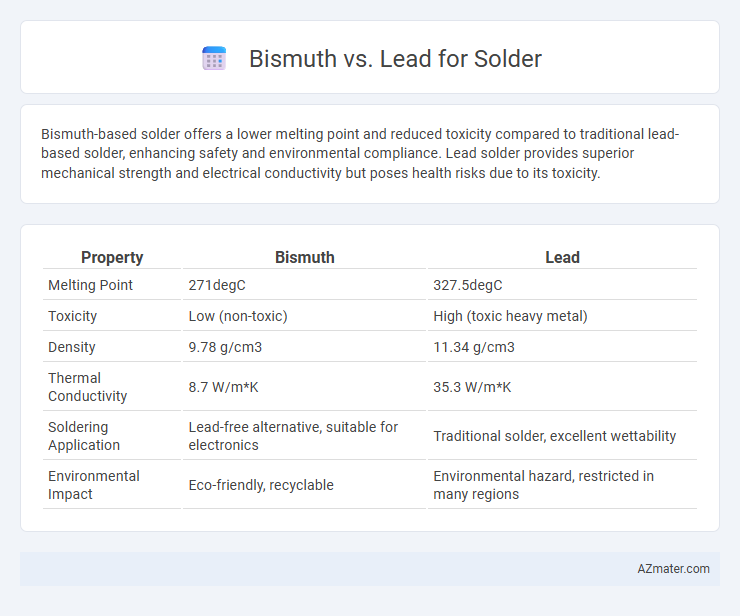Bismuth-based solder offers a lower melting point and reduced toxicity compared to traditional lead-based solder, enhancing safety and environmental compliance. Lead solder provides superior mechanical strength and electrical conductivity but poses health risks due to its toxicity.
Table of Comparison
| Property | Bismuth | Lead |
|---|---|---|
| Melting Point | 271degC | 327.5degC |
| Toxicity | Low (non-toxic) | High (toxic heavy metal) |
| Density | 9.78 g/cm3 | 11.34 g/cm3 |
| Thermal Conductivity | 8.7 W/m*K | 35.3 W/m*K |
| Soldering Application | Lead-free alternative, suitable for electronics | Traditional solder, excellent wettability |
| Environmental Impact | Eco-friendly, recyclable | Environmental hazard, restricted in many regions |
Introduction: Overview of Solder Materials
Bismuth and lead are two prominent materials used in solder alloys, each offering distinct properties for electronic assembly applications. Bismuth-based solders provide a lead-free alternative with low melting points and excellent thermal and electrical conductivity, promoting environmental compliance. Lead-based solders, traditionally dominant in electronics, exhibit strong mechanical strength and reliable joint formation but face restrictions due to toxicity concerns and regulatory measures such as RoHS compliance.
Chemical Properties: Bismuth vs Lead
Bismuth exhibits a low melting point of 271degC and excellent thermal stability, making it ideal for lead-free solder applications, whereas lead melts at 327.5degC and is toxic due to its heavy metal composition. Bismuth's chemical inertness results in minimal oxidation and corrosion during soldering, contrasting with lead's propensity for oxidation, which can degrade joint quality. The non-toxic nature of bismuth alloys supports environmental safety standards, whereas lead's chemical toxicity has led to regulatory restrictions globally.
Melting Points and Thermal Characteristics
Bismuth-based solders typically melt at lower temperatures, around 138-150degC, compared to traditional lead-based solders which melt near 183degC, making bismuth alloys suitable for heat-sensitive components. The thermal conductivity of lead solder ranges between 35-50 W/m*K, providing efficient heat dissipation, whereas bismuth solders generally exhibit lower thermal conductivity, potentially affecting heat transfer efficiency. These differences influence solder joint reliability and application choice in electronics manufacturing, especially where precise thermal management is critical.
Environmental and Health Impacts
Bismuth-based solders offer significant environmental advantages over lead-based solders due to their non-toxic nature and reduced health risks during manufacturing and disposal. Lead, a toxic heavy metal, poses severe hazards including neurotoxicity and environmental contamination, leading to stricter regulations and the push for lead-free alternatives in electronics. The use of bismuth in solder promotes safer recycling processes and minimizes harmful exposure to workers and ecosystems, aligning with global initiatives like RoHS and WEEE directives.
Electrical Conductivity Comparison
Bismuth-based solder alloys exhibit higher electrical conductivity compared to traditional lead-based solders, with bismuth solder offering approximately 10-15% better conductivity due to its lower resistivity (about 1.3 uO*cm) versus lead's resistivity (around 22 uO*cm). This improvement in electrical performance enhances signal integrity and reduces energy loss in electronic circuits, making bismuth a preferred choice for high-frequency and precision applications. Moreover, bismuth's non-toxic profile combined with its superior conductivity supports environmentally friendly and efficient soldering solutions in electronics manufacturing.
Mechanical Strength and Durability
Bismuth-based solder alloys exhibit higher mechanical strength and improved fatigue resistance compared to traditional lead-based solders, making them more suitable for applications requiring long-term durability under thermal cycling. Lead solder generally offers lower mechanical strength and is more prone to creep and joint degradation over time, limiting its performance in high-stress environments. The intrinsic brittleness of bismuth alloys is offset by enhanced hardness and reliability, resulting in solder joints with superior mechanical stability and extended service life.
Applications in Electronics Manufacturing
Bismuth-based solder alloys offer significant advantages over traditional lead-based solders in electronics manufacturing due to their lower melting points and non-toxic properties, improving worker safety and reducing environmental impact. Bismuth solders provide excellent thermal conductivity and mechanical strength, making them ideal for sensitive electronic components and precision assemblies. Widely adopted in lead-free electronics, bismuth solder enhances compliance with RoHS regulations while maintaining reliable electrical performance in high-density circuit boards and automotive electronics.
Regulatory Standards and Compliance
Bismuth-based solders comply with strict environmental regulations such as RoHS and REACH, making them a preferred choice for lead-free soldering in electronics manufacturing. Lead solder is increasingly restricted due to its toxic properties and is often banned in consumer electronics under regulatory standards worldwide. Transitioning to bismuth solder ensures compliance with global mandates aimed at reducing hazardous substances while maintaining reliable solder joint performance.
Cost Analysis and Market Availability
Bismuth solder is generally more expensive than lead solder due to the higher cost of raw bismuth and limited global supply, making cost a significant factor in large-scale manufacturing decisions. Lead solder remains widely available and cheaper, benefiting from established global production and distribution networks, though its use is increasingly restricted by environmental regulations. Market availability for bismuth solder is constrained by fewer suppliers and lower production volumes, impacting lead time and price stability compared to the more abundant and cost-effective lead solder options.
Conclusion: Choosing the Right Solder Material
Bismuth-based solder offers lower toxicity and improved environmental safety compared to lead solder, making it ideal for eco-conscious applications. Lead solder, however, provides superior mechanical strength and reliable electrical conductivity, preferred in high-stress electronic components. Selecting the right solder depends on balancing environmental regulations, mechanical performance requirements, and specific use-case demands in electronic manufacturing.

Infographic: Bismuth vs Lead for Solder
 azmater.com
azmater.com